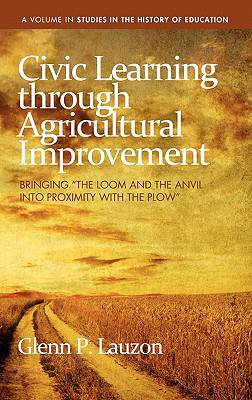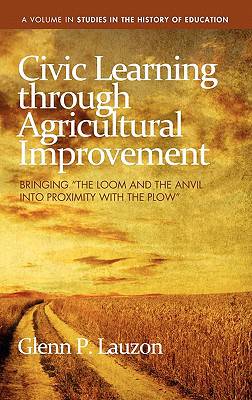
- Retrait gratuit dans votre magasin Club
- 7.000.000 titres dans notre catalogue
- Payer en toute sécurité
- Toujours un magasin près de chez vous
- Retrait gratuit dans votre magasin Club
- 7.000.000 titres dans notre catalogue
- Payer en toute sécurité
- Toujours un magasin près de chez vous
Civic Learning Through Agricultural Improvement
Bringing the Loom and the Anvil Into Proximity with the Plow (Hc)
Glenn P Lauzon
152,45 €
+ 304 points
Format
Description
A volume in Studies in the History of Education Series Editor: Karen L. Riley, Auburn University at Montgomery How do people use education to respond to change? How do people learn what is expected of "good citizens" in their communities? These questions have long concerned educational historians, civic educators, and social scientists. In recent years, they have captured national attention through high-profile education reform proposals and civic initiatives. The historian who reviews the relevant literature, however, will discover something odd: most of it focuses on schooling, despite the fact that, prior to the middle of the twentieth century, formal schooling played only a small (but significant) part in most people's lives. What other educational forces and institutions bring civic ideals to bear upon minds and hearts? This question is rarely raised. At issue is a conceptual problem: we, today, tend to equate "education" with "schooling." Do county fairs and farmers' associations have anything to do with civic education? Drawing insights from debates at the time of the "founding" of the history of education as a branch of modern scholarship, this author asserts that they do. Using the life of county fairs, farmers' associations, and farmers' institutes as its central thread, this book explores how prominent town-dwellers and leading farmers tried to use agricultural improvement to grow towns and to shape civic sensibilities in the rural Midwest. Promoting economic development was the foremost concern, but the efforts taught farmers much about their "place" as "good citizens" of industrializing communities. As such, this study yields insights into how rural people of the nineteenth century came to accept the ideal that "town" and "country" were interdependent parts of the same community. In doing so, it reminds educators and historians that much education and learning - particularly of the civic sort - takes place beyond the schoolhouse.
Spécifications
Parties prenantes
- Auteur(s) :
- Editeur:
Contenu
- Nombre de pages :
- 260
- Langue:
- Anglais
- Collection :
Caractéristiques
- EAN:
- 9781617351488
- Date de parution :
- 23-11-10
- Format:
- Livre relié
- Format numérique:
- Genaaid
- Dimensions :
- 156 mm x 234 mm
- Poids :
- 539 g







